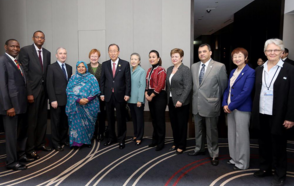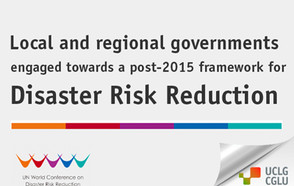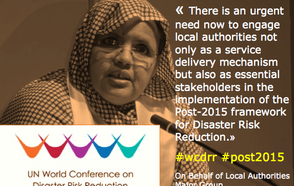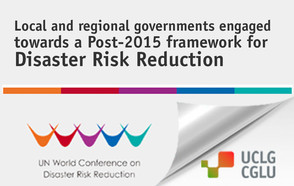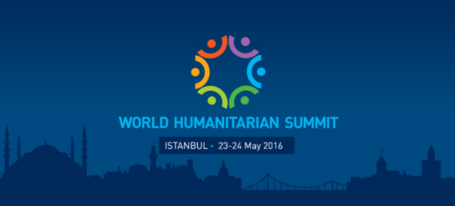
The Global Alliance for Urban Crises will be officially launched during the World Humanitarian Summit taking place on 23-24 May 2016 in Istanbul, Turkey. The Alliance aims to bring together UN agencies, urban professionals, the development community and the private sector on a common platform for advocacy, lobbying and action to respond to the growing importance of urban humanitarian assistance.
Local authorities central to crisis response
UCLG, as the representative of local governments, together with a wide variety of organizations, has committed to form a platform that creates effective and efficient partnerships to prevent, prepare for and better respond to urban crises, building on the long-standing work of the membership in this field and in particular the work of the UCLG Working Group on Local Government Disaster Response.
The launch of the Global Alliance for Urban Crises will focus on:
- The “Urban Crisis Charter”, committing members to work together to enable urban societies.
- Partnership modalities, including governance and membership conditions between partners
- An Action Plan structured around a set of concrete initiatives with a 5-year time frame.
The Alliance has drafted a set of Urban Recommendations and a Global Urban Crises Charter, pointing to (among others) the need to ‘foster collaboration between city, humanitarian and development actors’, to promote ‘area-based approaches’ in urban response and to ‘prioritise local municipal leadership in determining response to urban crisis’.
World Humanitarian Summit
The launch of this initiative will take advantage of the first-ever World Humanitarian Summit (WHS) in Istanbul that will gather over 5,000 participants. Representatives will include heads of state and government, mayors and local elected officials, crisis-affected communities, CEOs from the private sector, heads of multilateral organizations, national and international NGOs, and representatives from the youth, civil society, and academic sectors.
This summit is a global call to action by UN Secretary-General Ban Ki-moon, to set an agenda for change to make humanitarian action fit for the great challenges we face now and in the future. The main goals of the WHS are:
- To re-inspire and reinvigorate our commitment to humanity and to the universality of humanitarian principles.
- To initiate a set of concrete actions and commitments aimed at enabling countries and communities to better prepare for and respond to crises, and be more resilient to shocks.
- To share innovations and best practices that can help to save lives around the world, put affected people at the center of humanitarian action, and alleviate suffering.
The numerous parallel events are planned within the framework of the summit. UCLG’s participation in these sessions is focused on the following two side events, which members are also encouraged to join:
1. Mayors’ Focus Session on Migration
The city of Istanbul, together with UCLG, will organize a parallel session focused on the role of mayors in managing humanitarian crises. This session is dedicated to local authorities and how they face humanitarian crises, and in particular migration issues. Around a hundred local elected officials are expected to participate to this session that will highlight the fundamental role of local authorities in crisis management.
2. Perspectives from Cities in Crisis
This session, organized by UCLG/CUF and IMPACT, will present joint recommendations based on the field study “Perspectives from cities in crisis” carried out by UCLG’s Taskforce on Local Government Disaster Response - led by Cités Unies France (CUF) - and IMPACT. The goal of this event is to contribute to a better understanding of how emergency response can be better tailored to the nature, scale and complexity of cities.
The purpose of this event is to contribute to a better understanding of how emergency response can be better tailored to the nature, scale and complexity of cities. The side event will bring together urban stakeholders from local government and civil society for an interactive moderated discussion. Drawing on the personal experiences of the panelists in recent urban humanitarian crises and from the recommendations of the consultations recently conducted with local authorities in 6 crisis-affected cities, approaches for more effective future interventions in the complex context of urban areas will be highlighted.
The discussion will center around the different roles that local actors can play before, during and after a response; approaches to fostering pro-active engagement of local actors, notably municipalities and civil society, before, during and after a crisis occurs, and efficient coordination mechanisms with international stakeholders and the importance of partnership between non-state actors and municipal actors to build capacity and complementarity.
By the end of the session, the messages to emerge from the event should include how the coordination gap between humanitarian actors and local actors can be addressed; the role that an area-based approach to programming and coordination can build on the existing strengths of all actors involved and the ways in which the involvement of local actors, including local government and local civil society, can address some of the gaps and challenges in humanitarian preparedness and response.
For more information











